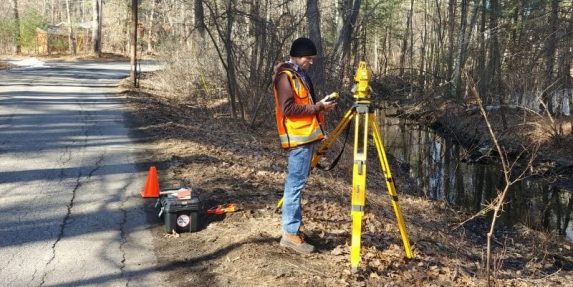At a recent remote presentation, Restoration Manager Kaitlyn Shaw and Colin Lawson of Trout Unlimited premiered the Howlett Brook Restoration project video (above) and answered questions about the project. This regional case study is funded by the Massachusetts Municipal Vulnerability Preparedness (MVP) Action Grants Program and the National Fish and Wildlife Foundation’s (NFWF) Forest and Rivers Fund. As the project proponent, the town of Boxford applied for the MVP grant on behalf of the towns of Boxford, Ipswich, and Topsfield. The project looks at how redesigning culverts and crossing will increase regional flood resiliency.
The project goal for the MVP funded portion of the project was to provide twelve 30% design plans and cost estimates for culverts and road stream crossings that adhere to the MA Stream Crossing Standards and future modeled climatic conditions, using the 100 year flood event data. Such storm events are predicted to become more common, and the plans include components that will increase regional flood resiliency, reduce community risk, and restore natural habitats in three municipalities. The strategy of the project was to prioritize sites throughout the Howlett Brook subwatershed in terms of herring habitat assessment and access to spawning habitat.
During the Q&A portion of the presentation Colin Lawson explain that, “the 30% design plans are a great first step [for both increasing regional flood resiliency and restoring herring habitat] because it shows the grantors you have a pretty good idea of what the cost will be to do that restoration, [which makes them] more likely to fund the on-the-ground restoration.” Already, replacement of the Pond Street culvert has been funded by NFWF, and is expected to be completed before August 2022.
Michelle Rowden, Regional Coordinator for MVP program says, “We are funding part of the project and are pretty excited about it. Our program strives to fund projects that will provide the highest level of climate resiliency to the greatest number of people, so regional projects like this we get pretty excited about, because we believe this project will increase resiliency on this regional scale using the climate data and projections. As you move forward that will become more and more important designing the culverts and the crossings. We’ve talked a lot about increased fish passage, ecological restoration, all of the positive ecological benefits that go along with those things. Those are all really important to the MVP program.”


Exciting project! Great video to highlight your work!